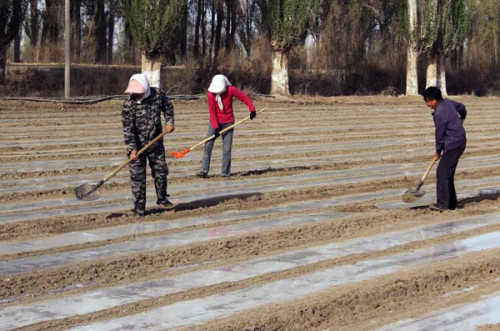

Farmers in Aksu, Xinjiang, level soil covered by PE film before sowing cotton seeds. (Photo: China Daily/Gao Bo)
Government subsidies
During the past decade, the institute has been developing machines to collect film discarded in cotton fields, and one of its designs-part thresher, part plastic-retrieval system-has been actively promoted.
"The government gives farmers a subsidy of 15,000 yuan ($2,400) when they buy one, almost one-sixth of the price," Wang Xuenong said. "So far this year, we have already received orders for 40 machines. As long as the film meets the new standards, the machine can collect nearly 90 percent of the used film if the ground has been cleared, and about 83 percent if the film was buried in the soil before the stalks were cut," he said.
Last year, the regional government chose Manas, a county in north Xinjiang, as an experimental area. Manas was chosen because PE film is used in the cultivation of cotton, corn, tomatoes and peppers on more than 85 percent of its 66,000 hectares of arable land. During the experiment, films of different thicknesses were tested to enable scientists to determine the optimum thickness for recycling and durability.
To encourage the use of the thicker 0.01-mm film, which raises the coverage cost to approximately 202.5 yuan per hectare, the local government offers farmers a subsidy of 255 yuan per hectare, said Bao Yuqin, the county's chief agro-technician.
Shi Changming, a 55-year-old farmer from Manas who has used PE film to grow cotton for decades, said the subsidy and his experience of "white pollution" prompted him to use the thicker film.
"Initially, we crushed the plant stalks and then plowed them into the ground along with the discarded film," he said. At first there were few problems, but the downside soon became apparent: Ribbons of plastic sheeting were carried into the village by the winds, and they also fouled plows so badly that the farmers were forced to clean them by hand every few hundred meters, he said.
Bao said the local government has now extended efforts to promote the use of thicker film by offering the subsidies to recycling stations and manufacturers that use the recycled plastic.
This year, Manas expects to see the recycling rate for film used in fields exceed 85 percent, and film used to build greenhouses will be fully recycled.
Although he welcomed the news, Wang Xuenong was concerned about the operations of factories that use recycled film as a raw material: "The retrieved film is often mixed with stalks, soil and other things, but the factories don't have the machinery to separate them. The job requires a lot of effort and uses a huge amount of water," he said. "Without government support, the factories may not stay in business for very long, and if they fail the whole recycling chain will break down."
Xinjiang to be at the heart of reforms of major State-owned energy firms
2015-03-17Xinjiang remains stable despite terror attacks: official
2015-03-10Xinjiang short of bilingual teachers
2015-02-24Guideline issued to help south Xinjiang
2015-02-13480,000 Xinjiang rural residents to access drinking water
2015-02-08Xinjiang economy expands 10 percent
2015-01-28Xinjiang to add more roads to villages
2015-01-25Copyright ©1999-2018
Chinanews.com. All rights reserved.
Reproduction in whole or in part without permission is prohibited.